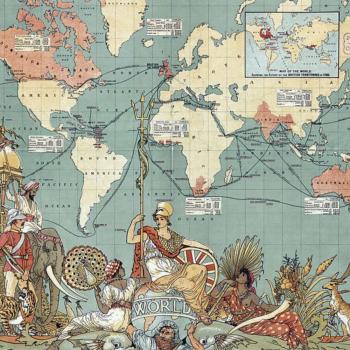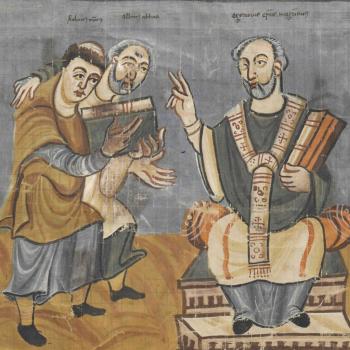I have strong prejudices concerning matters of immigration. I am an immigrant to the US, as is my wife. As immigration is such a lively topic of debate right now, I have some basic questions on which I would like advice and suggestions. Briefly – what should Christians think about immigration, and about the very existence of borders?
Over the past couple of years, a glance at most religious publications presents certain common themes about the proper attitude to immigration and immigrants. Among many other points, we can find a general consensus on some key points, such as:
Christianity teaches hospitality, and the welcoming of strangers;
The US has always been a nation of immigrants, with all the social and linguistic diversity that implies;
The vast majority of immigrants to the US contribute positively – often very positively indeed – to the country’s well being;
We should wholly condemn immigration policies that demean or discriminate against particular ethnic or religious groups;
Immigration policy should avoid inhumane practices, notably the breaking up of families, and the separation of children from parents;
It is reasonable and legitimate to examine whether agencies and institutions have behaved unjustly or oppressively, and if they have, to institute reforms.
Can we stipulate these points as matters of reasonable consensus, even as unexceptionable, before moving on?
But here is the problem. I understand what Christians are meant to be against in matters of immigration policy. But what are they for? If you acknowledge all those points just mentioned, where do we go from there? What would a Christian immigration policy look like?
Most basically, should there be borders at all? Most people would certainly accept that principle, although currently, delusional celebrity politician Alexandra Ocasio-Cortez is effectively arguing that people of Latino descent should not be subject to any US border controls as they are natives of the continent, so that they can never be considered illegal residents. She is this seeking the effective abolition of Immigration and Customs Enforcement, ICE. We can debate the political consequences of such radical rhetoric, but if it does in fact become anything like Democratic Party policy, then that would likely ensure that the Trump presidency will continue well into the 2030s. But “AOC” does have the virtue of raising questions that are worth debating.
So should there even be a US border? This really gets to the whole question of nationhood and national identity, and one might argue that principles of universal brotherhood override nations. But the vast majority of Christians have no problem reconciling their faith with national loyalty, and with all the history that goes with it.
If one’s answer to that border question is “yes,” that the border should exist, then certain consequences surely follow. That border should be enforced, by admitting certain people and excluding others. We can debate the best grounds for that process of selection, but accepting that some kind of selection is essential. We cannot operate the border on an honor principle. There have to be immigration policies of some kind, backed by law, and people enforcing them.
You can reform ICE, “abolish ICE,” or at least change its name. But you absolutely have to have something like that, under whatever name, performing something like its current functions.
Following from that, we are accepting that people who violate those rules must be controlled or penalized in some way, whether by expulsion or by more extensive penal sanctions. That means arresting people who have broken laws, trying them, incarcerating them before trial, and imprisoning or expelling them afterwards. If not, then we are proclaiming that the border is a symbolic and meaningless token, with no practical effect.
Can a wholly open border be reconciled with the existence of the US as a nation state? Before anyone says it, the US was in fact such an open country before the early twentieth century, but that was when it was rapidly building up settlement, and more important, before modern means of mass shipping. That began in the 1890s, and mass immigration lasted for a generation before it was halted very suddenly. That was a fundamentally different world.
On practical grounds too, are there limits on the numbers that a country might reasonably be expect to admit? In an age of rapid travel and communication, large numbers of people can cross the world in short times. If a very large number of people sought to enter the US in a short period, at what point do numbers become a legitimate issue for concern? If the likely number of arrivals in a year was a hundred thousand, that would attract little concern. If it was a hundred million, that would rightly cause major fears about the social burden, the economic impact, the costs of settlement, and the possibility of assimilation. So where is the point between the high and low estimates at which even very open and moderate people begin to express concern?
A Christian might certainly argue against the existence of borders, and suggest no restrictions on immigration. That would be a consistent, principled, approach. But anyone arguing that really has an obligation to declare that extremely radical principle before pursuing any further commentary on the topic.
So what religious principles – what Christian principles – should shape attitudes to immigration? What would border controls and immigration policies have to look like before Christians should support them, and their enforcement? Or are they against everything on offer?
















